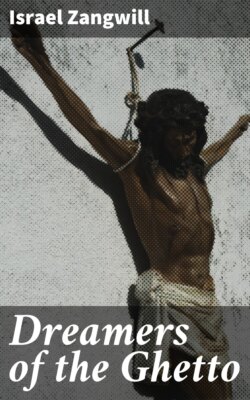Читать книгу Dreamers of the Ghetto - Israel Zangwill - Страница 25
На сайте Литреса книга снята с продажи.
II
ОглавлениеHe remounted his horse as he approached the market-place, from which the town climbed up; but he found his way blocked, for 'twas market-day, and the great square, bordered with a colonnade that made an Eastern bazaar, was thickly planted with stalls, whose white canvas awnings struck a delicious note of coolness against the throbbing blue sky and the flaming costumes of the peasants come up from the environs. Through a corner of the praça one saw poplars and elms and the fresh gleam of the river. The nasal hum of many voices sounded blithe and busy. At the bazaar entrance, where old women vended flowers and fruit, Gabriel reined in his horse.
"How happy these simple souls!" he mused. "How sure of their salvation! To count their beads and mutter their Ave Marias; 'tis all they need. Yon fisher, with his great gold ear-rings, who throws his nets and cuddles his Juanita and carouses with his mates, hath more to thank the saints for than miserable I, who, blessed with wealth, am cursed with loneliness, and loving my fellow-men, yet know they are but sheep. God's sheep, natheless, silly and deaf to the cry of their true shepherd, and misled by priestly wolves."
A cripple interrupted his reflections by a whining appeal. Gabriel shuddered with pity at the sight of his sores, and, giving him a piece of silver, lost himself in a new reverie on the mystery of suffering.
"Thine herbs sold out too!" cheerily grumbled a well-known voice, and, turning his head, Gabriel saw that the burly old gentleman addressing the wrinkled market-woman from the vantage-point of a mule's back was, indeed, Dom Diego de Balthasar, late professor of the logics at the University of Coimbra, and newly settled in Porto as a physician.
"Ay, indeed, ere noon!" the dried-up old dame mumbled. "All Porto seems hungry for bitter herbs to-day. But thus it happens sometimes about Eastertide, though I love not such salads myself."
"Naturally. They are good for the blood," laughed Dom Diego, as his eye caught Gabriel's. "And thou hast none, good dame."
There seemed almost a wink in the professorial eye, and the young horseman smiled in good-natured response to the physician's estimate of the jest.
"Then are the eaters sensible," he said.
"Ay, the only sensible people in Portugal," rejoined Dom Diego, changing his speech to Latin, but retaining his smile. "And the only good blood, Da Costa," he added, with what was now an unmistakable wink. But this time Gabriel failed to see the point.
"The only good blood?" he repeated. "Dost thou then hold with the Trappists that meat is an evil?"
A strange, startled look flashed across the physician's face, sweeping off its ruddy hue, and though his smile returned on the instant, it was as though forced back.
"In a measure," he replied. "Too much flesh generateth humors and distempers in the blood. Hence Holy Church hath ordained Lent. She is no friend to us physicians. Adeos!" and he ambled off on his mule, waving the young horseman a laughing farewell.
But Gabriel, skirting the market, rode up the steep streets troubled by a vague sense of a mystery, and later repeated the conversation to a friar at the college.
